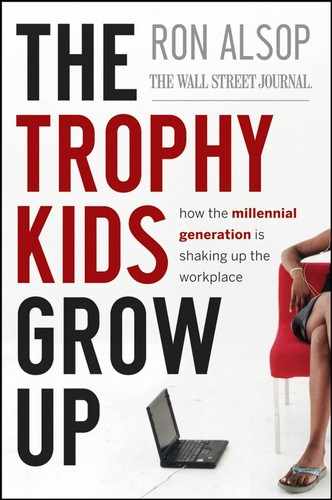11.2. THE GREENING OF RECRUITING
With their strong sense of civic duty, some millennials aspire to work for the Peace Corps and Teach for America. Others hope to start their own new ventures with a social or environmental mission.
But most millennials still expect to work for a large corporation. They won't settle for just any employer, however. They intend to join companies committed to social and environmental responsibility, and they want to be given time by their employers to perform community service. Some young people consider a reputation for corporate citizenship so important that they are even willing to accept a lower salary to work for a company they admire.
Nearly 80% of millennials say they prefer to work for a company that cares about making contributions to society, and 64% claim that corporate social and environmental activities would make them feel more loyal to an employer, according to the survey by Cone and Amp Insights. What's more, over half of millennials say they would refuse to join an irresponsible corporation.
Fortunately, this generation will find a growing number of companies in tune with its values. More companies see good deeds as good business these days. They have come to realize that positive reputations for social and environmental responsibility help attract customers, investors, and employees. That's why more businesses are making their corporate citizenship a key part of their recruiting pitch to the millennial generation.
Merrill Lynch & Co., for example, found that college students today are much more inclined than previous generations to ask senior executives about how much they give back to the community. That prompted the company to add messages about "investing in a greener future" and "helping those in need" to its recruiting brochures. Similarly, Wachovia Corp. recruiters make it a point to tell students about the financial services company's "green building" projects to reduce energy and water consumption.
General Electric Co. recruiters were pleased to find that the company's "ecoimagination" program to develop environmentally friendly products and technologies resonates strongly with millennials. Seth Dunn recruits millennials who are enthusiastic about developing renewable forms of energy, and he sees "an explosion of interest" in his company. "I attribute this largely to ecoimagination, which attracts millennials who want to work for a company that makes sustainability central to business strategy and does not ghettoize social and environmental issues to roles that consist mainly of PR, community service, and donations," he says. "It's a business strategy grounded in the critical sustainability issues that one could argue have been largely left to their generation to solve."
A growing number of companies also are starting programs to give millennials an opportunity to demonstrate their generosity. Timberland Inc., for example, has long been in sync with the millennial generation's priorities. Back in 1992, it began offering employees 16 hours of paid leave a year to do charitable work. The 16 hours gradually expanded to 40, and the boot and clothing maker also started allowing employees to take sixmonth sabbaticals to work with nonprofit organizations.
Now more companies are following Timberland's lead in their efforts to attract millennials. As part of their summer internships with FedEx Corp., for instance, college students take on community service projects in Memphis, Tennessee, such as fixing up dilapidated apartment buildings, sending care packages to Army soldiers, and tie-dying shirts for patients at St. Jude Children's Research Hospital.
Boston Consulting Group Inc. has created the Social Impact Fellowship Program, which lets incoming consultants work for a nonprofit organization for up to 10 weeks. Some fellows have joined Habitat for Humanity to build homes in such countries as El Salvador, Romania, India, and Mongolia. Others have applied their consulting talent to help nonprofits finance new ventures, develop growth strategies, and improve their operations. Junior consultants also are coaching undergraduate and M.B.A. students on projects for nonprofit groups. "We recognize that students care more than ever before about our firm's commitment to being a responsible corporate citizen," says Carly Janson, director of social impact for Boston Consulting.
Ernst & Young, which has even made corporate social responsibility part of annual performance reviews, encourages employees to volunteer to support both education and entrepreneurship. The accounting firm also selects some of its experienced high performers for three-month service sabbaticals to assist entrepreneurs in Latin America. "The millennial generation thinks we messed up and really wants to improve the world," says Deborah Holmes, director of corporate social responsibility. "We get a staggering number of resumes when we have a job opening involving social responsibility."
In a 2007 study on volunteering, Deloitte & Touche found that nearly two-thirds of 18- to 26-year-olds would prefer to work for companies where they could contribute their talents to nonprofit organizations. But only 39% said their current employers provide volunteer opportunities, and only about a quarter said recruiters even mentioned their company's community service efforts during the hiring process.
"Companies that encourage their people to contribute knowledge and experience to nonprofits will make a difference by giving back to the community and, at the same time, build the skills and morale of their people," says James Quigley, CEO of Deloitte Touche Tohmatsu. Among the accounting firm's volunteer efforts is its annual Impact Day, when as many as three-quarters of its employees set aside their work and make nonprofit agencies their clients.
